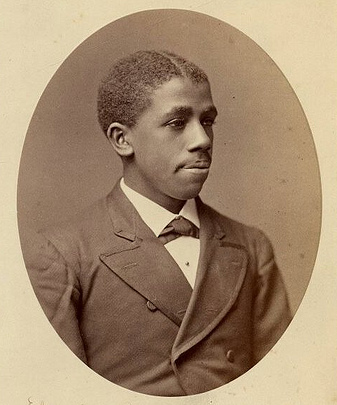
June 12, 2020, by Dr. Meghan Gray
Black Lives Matter and the First Black Person with a Physics PhD
A guest post by Dr. Moustafa Gharamti, who is the special tutor for Black and Minority Ethnic Students.

Edward Bouchet, Yale College class of 1874. Warren, Boston and Cambridgeport, Massachusetts / Public domain
Two weeks have passed since the start of Black Lives Matter protests. Protests all over the world raising one slogan “Black Lives Matter”. Three words that comprise the black race history, call for a change and equality and hope for a better future. The purpose of the word “lives” in black lives matter isn’t just to negate death, it’s there to represent everything that makes a human life. When we say black lives matter, we mean the freedom of black people matters, the skills of black people matter, the time and safe space of black people matter, the dignity of black people matters, the effort of black people matter etc … In the recent incidents that ignited the protests we had actual real life examples taped on phone cameras of how black lives didn’t matter for some people. In Ahmaud Arbury’s murder, we saw that his freedom didn’t matter, his safe space didn’t matter, and his life didn’t matter, but his skin colour mattered. In Christian Cooper’s Central Park incident, we saw that his activity didn’t matter, his kindness didn’t matter, his care didn’t matter, but his skin colour mattered. In George Floyd’s murder, we saw that his begging didn’t matter, his death rattle didn’t matter, his life didn’t matter, but his skin colour mattered.
The history of black people is full of similar stories. I would like to tell you about the story of a black Physicist called Edward Alexander Bouchet. In June 1876, Edward Bouchet became the first black person in history to receive a PhD in Physics, and the sixth person of any race to earn a Physics PhD from an American University [1,2]. Edward was born in September 1852. His father was a freed slave, and his mother was a housewife, and had three older sisters. Though most young black people at the time were doing vocational and technical training, Edward’s parents encouraged him to get an education. Due to racial segregation, Edward was enrolled in the Artisan Street Coloured School, where he had thirty school mates of different levels and one teacher. In 1968, Edward earned admittance to Hopkins Grammar School where he studied Mathematics, Latin, Greek and History.
In 1870, Edward graduated first in class and entered Yale College seeking an undergraduate degree in Science. After obtaining his bachelor’s degree, Edward spent two more years at Yale College where he did a PhD in Geometric Optics and wrote a thesis entitled “On Measuring Refractive Indices”. Getting a university job straight after a PhD was normal until the middle of the twentieth century [1]. But, despite Edward’s impressive education and achievements, he was unable to land a university job due to being black. Imagine how you would feel if there are only five other people in the whole country with the same credentials as yours but you’re unable to get a job. Edward then had to settle to high school teaching and spent the rest of his life teaching Physics, Chemistry, Astronomy, Physical Geography and Physiology for black students, and advocating for science education among the black community. Edward passed away in 1918, 42 years after receiving his Physics PhD. In the same year Elmer Imes became the second black person in history to earn a Physics PhD [1].
Though Edward’s impact on black science education is huge, his scientific research was hindered by the widespread racism of the time. His skills, talents and efforts didn’t matter because of the colour of his skin. There is no limit to the success that a physicist of Edward’s calibre could have achieved had he been given the same opportunities as other physicists of his time. Any act of racism doesn’t just hurt the target, it deprives the entire humanity from a better future.
[1] Ronald E. Mickens, ed., Edward Bouchet, The First African-American Doctorate, World Scientific Publishing Company (2002).
[2] https://www.aps.org/publications/apsnews/200706/history.cfm
Other Places to read about Dr. Edward Bouchet:
http://www.math.buffalo.edu/mad/physics/bouchet_edward_alexander.html
https://ebasi.org/biobouchet.html
No comments yet, fill out a comment to be the first

Leave a Reply